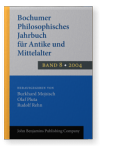Theoretisch glücklich
Bedeutung und Zusammenhang der Glücksbestimmungen in Aristoteles’ Nikomachischer Ethik
In his Nicomachean Ethics Aristotle gives us two definitions of happiness (eudaimonia): In book I he defines eudaimonia as activity in accordance with the best and most perfect virtue, and very much later in the treatise, in book X, he states that the contemplative life of the philosopher is the most blessed life, and the life of the politician only second in rank. This paper argues that most interpreters have misunderstood the first definition (i.e. they have not correctly identified the best and most perfect virtue) due to the temptation to read the first book with the tenth in mind. A new interpretation of the first definition is corroborated and linked with Aristotle’s statements in book X, so that the entire work seems to be more consistent. Furthermore, a solution to the vexed problem whether moral virtues play a role in the contemplative life is suggested.
Article language: German
Cited by (1)
Cited by one other publication
[no author supplied]
2011.
Literaturverzeichnis. In
Die Philosophie Marc Aurels,
► pp. 714 ff.

This list is based on CrossRef data as of 1 august 2024. Please note that it may not be complete. Sources presented here have been supplied by the respective publishers.
Any errors therein should be reported to them.
